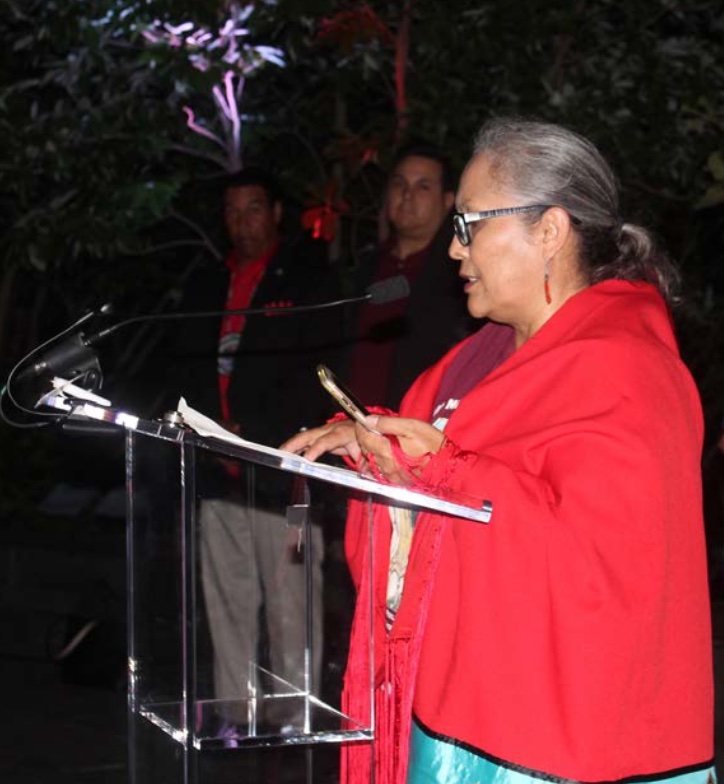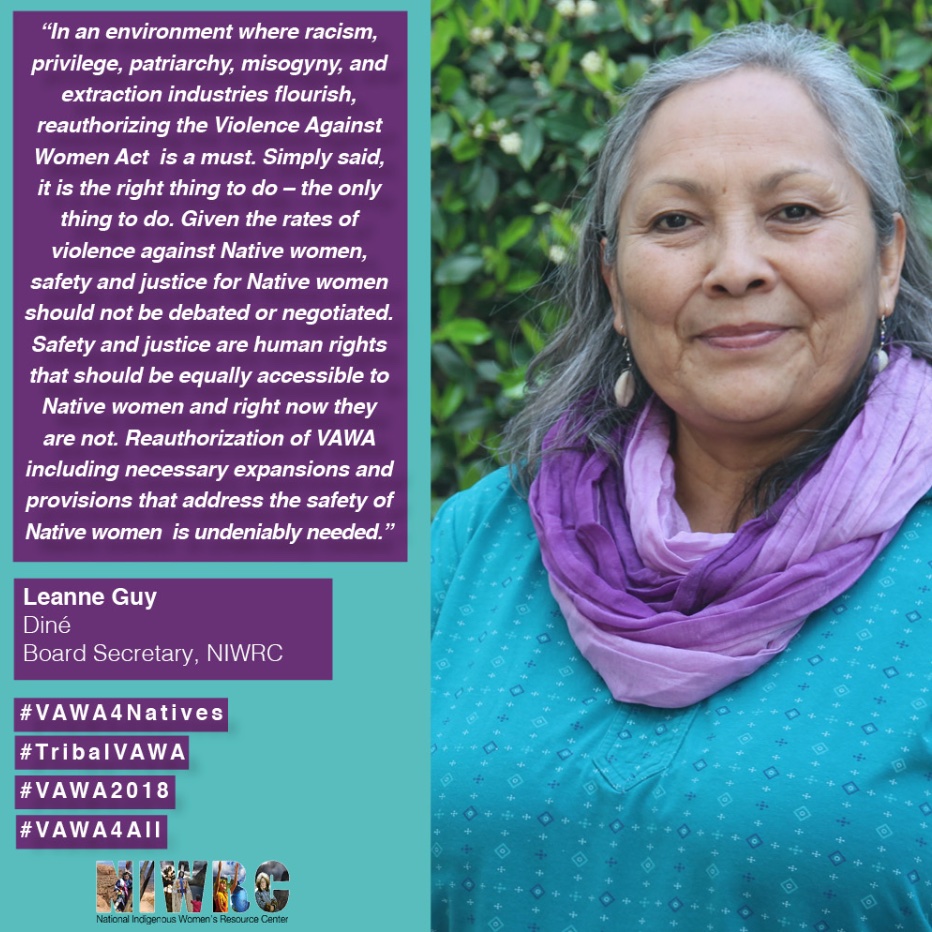Leanne Guy, Executive Director, Southwest Indigenous Women’s Coalition Statement National Vigil Honoring Missing and Murdered Native Women
 Hello, my name is Leanne Guy. I’m from the Diné Nation in the Four Corners area. My clans are Tó’áhani (Near to Water) and I’m born for Tódích’íi’nii (Bitter Water). My chei (maternal grandfather) is Tábaahí and my nali (paternal grandfather) is Táchii’nii (Red Running into the Water). I am a mother, grandmother, sister, auntie, and work as an agent of social change. I am the founding executive director for the Southwest Indigenous Women’s Coalition, a statewide tribal domestic and sexual violence coalition, and I also serve on the boards of the National Indigenous Women’s Resource Center and the Alliance of Tribal Coalitions to End Violence.
Hello, my name is Leanne Guy. I’m from the Diné Nation in the Four Corners area. My clans are Tó’áhani (Near to Water) and I’m born for Tódích’íi’nii (Bitter Water). My chei (maternal grandfather) is Tábaahí and my nali (paternal grandfather) is Táchii’nii (Red Running into the Water). I am a mother, grandmother, sister, auntie, and work as an agent of social change. I am the founding executive director for the Southwest Indigenous Women’s Coalition, a statewide tribal domestic and sexual violence coalition, and I also serve on the boards of the National Indigenous Women’s Resource Center and the Alliance of Tribal Coalitions to End Violence.
I want to thank each one of you for being here, for taking the time to show and voice your support for the missing and murdered Native women and girls. I want to begin by saying a few names of Native women, including transwomen and young girls I have read about, heard about, and personally know about who have gone missing, disappeared, and/or murdered as it is important that we never forgot them and that we take the time to honor them.
Hannah Harris, Savanna LaFontaine-Greywind, Misty Upham, Ashlynn Mike, Arial Begaye, Sharon Kills Back, Laverda Guy Sorrell, Rethema Lee, Earline Chavez, Lavon “Raven” Nevaktewa, and Teri Benally.
These women represent only a small fraction of the number of Native women who are missing, who have been murdered.
As Native women in this movement to end violence against Native women, we know firsthand the devastating impact violence has had on our tribal communities. We see and hear the stories of this violence as it plays out in our communities. We feel the heartwrenching pain of what our tribal communities are going through. We hear the deep inconsolable cries from family members whose child, sister, auntie, mom, or grandmother has gone missing, or are found cold and lifeless. We know the injustices of how many of these cases are handled. We also know that many of these cases are directly related to domestic violence, rape, and sex trafficking. We know the intense level of healing that needs to happen, which for many families includes closure of knowing what happened to their beloved child, sister, auntie, mom, or grandmother.
The women and young girls who fell victim to being taken and murdered had lives, jobs, families, dreams, hopes, and plans. Their lives mattered. They had no idea of what was in store for them. They did not deserve (no one deserves) to leave this world in such a violent way. But they did, largely in part because of who they were—Native women and girls.
So, some of the questions for me are: Why? Where did this violence come from? How did we get to this point? Why are Native women devalued? When will Native lives matter? Why are we still invisible? The answers I am finding relate to colonization. In a recent article by Sarah Deer, she makes the argument that if we are to truly address the violence against Native women then we need to address how rape was used and is used still as a weapon of conquest and that we must acknowledge as a nation that the U.S. was founded in part through the use of sexual violence as a tool.
As Native peoples, we also know there are many factors that lead to the high rates of violence against Native women and the inadequate or non-response to the violence. Issues such as racism, misogyny, patriarchy, the extraction industry, inadequate criminal justice systems, inadequate funding to tribes, nonexistent or understaffed law enforcement, lack of understanding of tribal sovereignty, and the inability of tribes to fully protect their tribal members, their women and children, exist because of bad federal laws that are still, unbelievably, in place that strip tribes’ authority to be the sovereign nations that they are.
With this knowledge comes the need to come together, like we are this evening, and to educate and advocate for the riddance of these bad laws and to stay vigilant in the fight against issues like racism, misogyny, and disparity in resources and funding. We must remain united, organized, strong in our voice, and proactive in our work in this movement.
Today, I heard in our meeting the phrase, “We are sovereign women from sovereign nations,” and it occurred to me that I have never, until now, felt the strength, hope, and inherent right embedded within those words. So, we, as Native women, Indigenous women, must take the lead and feel those words and stand in our power so that Hannah, Savanna, Misty, Ashlynn, Arial, Sharon, Laverda, Rethema, Earline, Lavon, Teri, and the thousands of other Native women and girls who have gone missing and/or have been murdered will not have been for nothing. It is a future that brings healing, justice, and safety that we look to and must continue to fight for.






